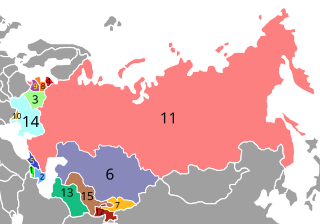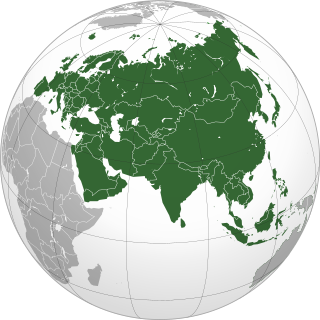Related Research Articles

The term "Soviet empire" collectively refers to the world's territories that the Soviet Union dominated politically, economically, and militarily. This phenomenon, particularly in the context of the Cold War, is also called Soviet imperialism by Sovietologists to describe the extent of the Soviet Union's hegemony over the Second World.
Soviet and communist studies, or simply Soviet studies, is the field of regional and historical studies on the Soviet Union and other communist states, as well as the history of communism and of the communist parties that existed or still exist in some form in many countries, both inside and outside the former Eastern Bloc, such as the Communist Party USA. Aspects of its historiography have attracted debates between historians on several topics, including totalitarianism and Cold War espionage.

The post-Soviet states, also referred to as the former Soviet Union (FSU) or the former Soviet republics, are the independent sovereign states that emerged/re-emerged out of the dissolution of the Soviet Union in 1991. Prior to their independence, they existed as Union Republics, which were the top-level constituents of the Soviet Union. There are 15 post-Soviet states in total: Armenia, Azerbaijan, Belarus, Estonia, Georgia, Kazakhstan, Kyrgyzstan, Latvia, Lithuania, Moldova, Russia, Tajikistan, Turkmenistan, Ukraine, and Uzbekistan. Each of these countries succeeded their respective Union Republics: the Armenian SSR, the Azerbaijan SSR, the Byelorussian SSR, the Estonian SSR, the Georgian SSR, the Kazakh SSR, the Kirghiz SSR, the Latvian SSR, the Lithuanian SSR, the Moldavian SSR, the Russian SFSR, the Tajik SSR, the Turkmen SSR, the Ukrainian SSR, and the Uzbek SSR. In Russia, the term "near abroad" is sometimes used to refer to the post-Soviet states other than Russia.

Russian Fascism: Traditions, Tendencies, Movements is a 2001 book by Stephen D. Shenfield.
Eurasianism is a socio-political movement in Russia that emerged in the early 20th century under the Russian Empire, which states that Russia does not belong in the "European" or "Asian" categories but instead to the geopolitical concept of Eurasia governed by the "Russian world", forming an ostensibly standalone Russian civilization.

Russian nationalism is a form of nationalism that promotes Russian cultural identity and unity. Russian nationalism first rose to prominence as a Pan-Slavic enterprise during the 19th century Russian Empire, and was repressed during the early Bolshevik rule. Russian nationalism was briefly revived through the policies of Joseph Stalin during and after the Second World War, which shared many resemblances with the worldview of early Eurasianist ideologues.

The Association for Slavic, East European, and Eurasian Studies (ASEEES) is a scholarly society "dedicated to the advancement of knowledge about Central Asia, the Caucasus, Russia, and Eastern Europe in regional and global contexts." The ASEEES supports teaching, research, and publication relating to the peoples and territories within this area.

Eurasia is the largest continental area on Earth, comprising all of Europe and Asia. According to some geographers, physiographically, Eurasia is a single continent. The concepts of Europe and Asia as distinct continents date back to antiquity, but their borders have historically been subject to change, for example to the ancient Greeks Asia originally included Africa but they classified Europe as separate land. Eurasia is connected to Africa at the Suez Canal, and the two are sometimes combined to describe the largest contiguous landmass on Earth, Afro-Eurasia.
The drug policy of the Soviet Union changed little throughout the existence of the state, other than slowly becoming more repressive, although some differences in penalties existed in the different Union Republics. However, the prevalence of drug addiction remained reportedly low as first claimed by Soviet authorities which later acknowledged a much larger problem; at least to drugs other than alcohol or tobacco; however, the rates of addiction increased in post-Soviet states.

The Kazakh famine of 1930–1933, also known as the Asharshylyk, was a famine during which approximately 1.5 million people died in the Kazakh Autonomous Socialist Soviet Republic, then part of the Russian Socialist Federative Soviet Republic in the Soviet Union, of whom 1.3 million were ethnic Kazakhs. An estimated 38 to 42 percent of all Kazakhs died, the highest percentage of any ethnic group killed by the Soviet famine of 1930–1933. Other research estimates that as many as 2.3 million died. A committee created by the Kazakhstan parliament chaired by Historian Manash Kozybayev concluded that the famine was "a manifestation of the politics of genocide", with 1.75 million victims.
Postsocialism is the academic study of states after the fall or decline of socialism, especially in Eastern Europe and Asia. The "socialism" in postsocialism is not based on a Marxist conception of socialism but rather, especially in the Eastern European context, on the idea of "actually existing socialism". Scholars of postsocialist states maintain that, even if the political and economic systems in place did not adhere to orthodox Marxist ideas of "socialism", these systems were real and had real effects on cultures, society, and individuals' subjectivities. Scholars of postsocialism often draw from other theoretical frameworks like postcolonialism and focus especially on the evolution of labor relations, gender roles, and ethnic and religious political affiliations. The idea of postsocialism has also been criticized, however, for placing so much emphasis on the impact of socialism while the term socialism remains difficult to define, especially if extended beyond Eastern Europe.

Russian imperialism includes the policy and ideology of power exerted by Russia, as well as its antecedent states, over other countries and external territories. This includes the conquests of the Russian Empire, the imperial actions of the Soviet Union, as well as those of the modern Russian Federation. Some postcolonial scholars have noted the lack of attention given to Russian and Soviet imperialism in the discipline.
This is a select bibliography of post-World War II English language books and journal articles about the Revolutionary and Civil War era of Russian (Soviet) history. The sections "General surveys" and "Biographies" contain books; other sections contain both books and journal articles. Book entries may have references to reviews published in English language academic journals or major newspapers when these could be considered helpful. Additional bibliographies can be found in many of the book-length works listed below; see Further reading for several book and chapter length bibliographies. The External links section contains entries for publicly available select bibliographies from universities.
This is a select bibliography of post-World War II English-language books and journal articles about Stalinism and the Stalinist era of Soviet history. Book entries have references to journal reviews about them when helpful and available. Additional bibliographies can be found in many of the book-length works listed below.
This is a select bibliography of English language books and journal articles about the post-Stalinist era of Soviet history. A brief selection of English translations of primary sources is included. The sections "General surveys" and "Biographies" contain books; other sections contain both books and journal articles. Book entries have references to journal articles and reviews about them when helpful. Additional bibliographies can be found in many of the book-length works listed below; see Further reading for several book and chapter-length bibliographies. The External links section contains entries for publicly available select bibliographies from universities.
This is a select bibliography of English language books and journal articles about the Soviet Union during the Second World War, the period leading up to the war, and the immediate aftermath. For works on Stalinism and the history of the Soviet Union during the Stalin era, please see Bibliography of Stalinism and the Soviet Union. Book entries may have references to reviews published in English language academic journals or major newspapers when these could be considered helpful.

Timothy James Colton is a Canadian-American political scientist and historian currently serving as the chair of The Harvard Academy for International and Area Studies, housed at the Weatherhead Center for International Affairs at Harvard University. Dr. Colton is the Morris and Anna Feldberg Professor of Government and Russian Studies. His academic work and interests are in Russian and post-Soviet politics. He is currently an editorial board member for World Politics and Post-Soviet Affairs. He has been a fellow of the American Academy of Arts and Sciences since 2011. He is the brother of former CBC Radio Washington, D.C. correspondent, Michael Colton.
This is a select bibliography of English language books and journal articles about the history of Russia and its empire from 1991 to present. It specifically excludes topics related to the Dissolution of the Soviet Union; see Bibliography of the Post Stalinist Soviet Union for information on this subject. This bibliography is restricted to works about Russian history, and specifically excludes items such modern travel logs and guide books, popular culture, etc.

This is a select bibliography of English language books and journal articles about the history of Central Asia. A brief selection of English translations of primary sources is included. Book entries have references to journal articles and reviews about them when helpful. Additional bibliographies can be found in many of the book-length works listed below; see Further reading for several book and chapter-length bibliographies.
This is a select bibliography of English language books and journal articles about the history of Belarus and Byelorussia. A brief selection of English translations of primary sources is included. Book entries have references to journal articles and reviews about them when helpful. Additional bibliographies can be found in many of the book-length works listed below. The External links section contains entries for publicly available select bibliographies from universities.
References
- ↑ Bonnell, Victoria E.; Breslauer, George W. (1 December 1998). "Soviet and Post-Soviet Area Studies". Soviet and Post-Soviet Studies. Retrieved 1 November 2022.
- ↑ Sakwa, Richard (October 1999). "Postcommunist studies: once again through the looking glass (darkly)?". Review of International Studies. 25 (4): 709–719. doi:10.1017/S0260210599007093. S2CID 144164154.
- ↑ Tomohiko, Uyama (2015). "The Contribution of Central Eurasian Studies to Russian and (Post-)Soviet Studies and Beyond". Kritika: Explorations in Russian and Eurasian History. 16 (2): 331–344. doi:10.1353/kri.2015.0020. ISSN 1538-5000. S2CID 159368915 . Retrieved 1 November 2022.
- ↑ Kotchikian, Asbed (1 March 2006). "From Post-Soviet Studies to Armenianology" (PDF). Demokratizatsiya: The Journal of Post-Soviet Democratization. 14 (2): 303–311. doi:10.3200/demo.14.2.303-311.
- ↑ Laitin, David D. (June 2000). "Post-Soviet Politics". Annual Review of Political Science. 3 (1): 117–148. doi: 10.1146/annurev.polisci.3.1.117 .
- ↑ Spivak, Gayatri Chakravorty (May 2006). "Are You Postcolonial? To the Teachers of Slavic and Eastern European Literatures". Publications of the Modern Language Association of America. 121 (3): 828–829. doi:10.1632/S0030812900165903. S2CID 233315161.
- ↑ Buckler, Julie A. (January 2009). "What Comes after 'Post-Soviet' in Russian Studies?". Publications of the Modern Language Association of America. 124 (1): 251–263. doi:10.1632/pmla.2009.124.1.251. S2CID 2240953.